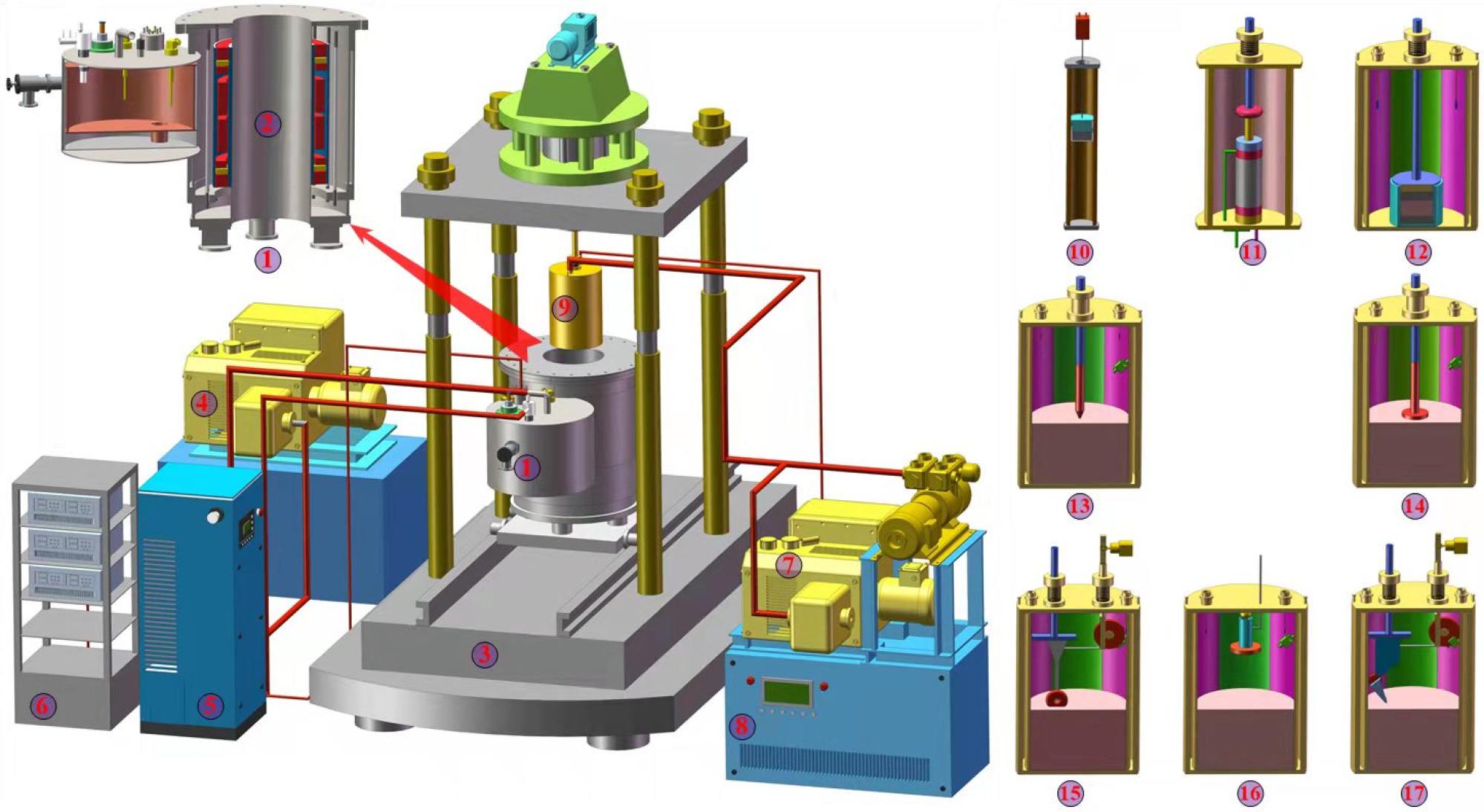Last updated on February 8, 2021
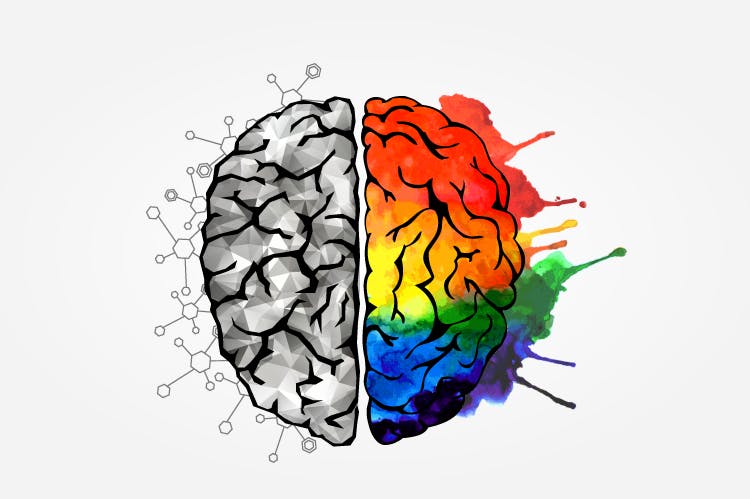
At Flint Rehab, we believe that stroke recovery tips should address both your physical health and your lifestyle, as both impact recovery.
In this article, we gathered 25 helpful stroke recovery tips and organized them into the following sections:
- Physical Healing Stroke Recovery Tips
- Mindset & Habit Stroke Recovery Tips
- Stroke Recovery Tips on Happiness
Click any of the links to jump straight to that section.
Physical Healing Stroke Recovery Tips
First up, we’ll share some tips on the technical side of stroke recovery. These tips will address the physical side of recovery: overcoming the secondary effects and regaining independence.
Let’s start at the beginning:
1. Understand How the Brain Heals
Did you know that the brain is capable of healing itself after an injury like a stroke? It revolves around the phenomenon of neuroplasticity: the mechanism that your brain uses to rewire itself and create new neural pathways.
Neuroplasticity is arguably the most important concept to focus on during stroke recovery. And it can be boiled down into this popular neuroscience phrase: “neurons that fire together, wire together.” The skills that you practice on a regular basis are the skills that your brain improves.
To learn more about neuroplasticity, check out the book The Brain that Changes Itself by Norman Doidge. It’s one of our top recommended stroke recovery books.
The next tip will discuss how to activate neuroplasticity:
2. Focus on “Massed Practice” to Regain Lost Skills
Neuroplasticity is guided by experience. The more you practice something (and gain experience with it) the more your brain will attempt to get better at that skill.
This is why riding a bike helps you get better at riding a bike. As you continue to practice and gain experience, your brain is busy rewiring itself to create and strengthen neural pathways that control your balance, steering, pedaling, and other relevant skills.
Similarly, this is also why consistent rehabilitation exercise is an essential ingredient for stroke recovery. You need to gain experience with movement in order to improve at moving your body. The more you practice leg exercises, for example, the more your leg mobility will improve as a result of that experience.
3. Focus on Good Nutrition
As your brain and body recover from the secondary effects of a stroke, you can boost recovery by focusing on proper nutrition.
Some of the best foods for stroke recovery are whole foods like vegetables, nuts, and whole grains. It may also help to limit saturated fat and sugar intake, as these foods limit “neuronal and behavioral plasticity.”
Also, be sure that your diet is rich in vitamins for stroke recovery. If you don’t get enough vitamins through your diet, consult with your doctor before taking any new vitamins or supplements.
4. Don’t Get Discouraged If Progress Slows
The stroke recovery plateau often occurs around the three month mark, generally speaking. At this point, recovery tends to slow down — but it will not stop as long as you don’t stop participating in rehabilitation.
Studies have shown that some stroke survivors are at the same level of improvement 5 years post-stroke as they were 2 months post-stroke. One possible reason for this long-term plateau could be a lack of consistent rehabilitation at home.
The brain needs consistent stimulation in order to rewire itself. To avoid getting stuck in a plateau, it’s imperative to find an appropriate home therapy regimen and stick with it.
Want 25 pages of stroke recovery exercises in PDF form? Click here to download our free Stroke Rehab Exercise ebook now (link opens a pop up for uninterrupted reading)
5. Avoid “Learned Nonuse”

During stroke recovery, the phrase “use it or lose it” is commonly used to describe the condition of learned nonuse. This occurs when you completely stop using your affected limb(s), and after a while your brain forgets how to use it.
The brain likes to be efficient. When you stop using your affected arm or leg, for example, the brain thinks that arm or leg movement is not as important. Then, to become as efficient as possible, it deprioritizes arm or leg movement on that side. And if the neglect continues, it leads to learned nonuse.
For this reason, all movement is beneficial during recovery. If you struggle with post-stroke paralysis, passive movement (where you assist your limbs through a movement) helps stimulate the brain and prevent learned nonuse.
6. Think About Spasticity Differently
If you are new to the world of stroke recovery, it’s important to educate yourself about all the various physical effects that can occur, such as spasticity.
Spasticity involves stiff, tight muscles that result from miscommunication from the brain. When the brain has been impacted by injury, like a stroke, it might not be able to send the right signals to your muscles anymore. As a result, your muscles tighten up as a result of being over-active, with your brain being unable to tell them to relax when they should.
It can help to realize that the problem is not with your muscles — instead, spasticity originates from the brain. And you can help reduce spasticity and restore mobility in your muscles by engaging neuroplasticity.
As you exercise your affected muscles, you encourage the brain to rewire itself and, as a result, spasticity becomes less severe. This is only possible through consistent exercise, though, as the brain needs repetitive stimulation in order to rewire itself.
7. Experiment with Different Rehabilitation Methods
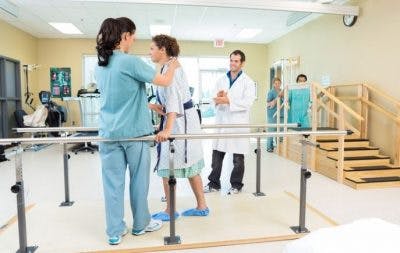
There are many techniques for stroke rehabilitation, such as gait training, mirror therapy, and electrical stimulation.
Since every stroke is different, every survivor will benefit from different rehabilitation techniques. What works for one person might not work for you, and vice versa.
Therefore, it can be helpful to experiment with various techniques and explore them with the safe guidance from your therapist. Continue to experiment until you find what works for you, and then do that consistently with your therapist and at home.
8. Sleep When Your Body Asks for It
Jill Bolte Taylor’s top recommendation for stroke survivors is sleep. (And if you haven’t heard of Jill before, she’s a stroke survivor and brain scientist that gave one of the most-watched TedTalks of all time about her stroke, called “My Stroke of Insight.”)
A recovering brain needs sleep for various reasons. One particularly motivating reason is that sleep helps improve movement recovery after stroke. If you want to improve mobility, then be sure to give yourself plenty of rest along with your daily rehabilitation exercise.
Want 20 pages of stroke recovery tips in an illustrated PDF? Download our free ebook by clicking here (link opens a pop up for uninterrupted reading)
9. Take Steps for Stroke Prevention
Stroke survivors are at higher risk of experiencing another stroke, which means that stroke prevention is key. Some great places to start are understanding your stroke risk factors, taking any medication prescribed by your doctor, and staying active.
10. Focus on Foot Drop
If you suffer from foot drop, then ankle foot orthotics (AFOs) can help improve your safety and make walking easier. If an AFO is appropriate for you, your physical therapist would be able to recommend this. It’s important to realize that this is a compensatory strategy, which means that, while you are protecting your safety, you are not addressing the root issue.
To reduce foot drop and wean off the need for an AFO, be sure to exercise your foot regularly. A consistent foot drop exercise routine can help rewire the brain and improve mobility in your foot.
Mindset and Habit Stroke Recovery Tips
Now let’s move onto our mindset and habit tips for stroke recovery. These can help build the foundation that allows the physical healing to manifest.
11. Set Clear, Measurable Goals
Setting goals during stroke recovery can serve as a powerful form of motivation, especially if your goals are specific, measurable, realistic, and challenging. For instance, you could set a goal to move from a walker to a quad cane within the next 6 months — if that’s something realistic and challenging for you. Your therapists should guide you in goal-setting while always keeping your priorities in mind.
12. Use the 1% Motivation Method
The all-or-nothing approach can lead to burnout during stroke recovery (or anything else for that matter). If you feel overwhelmed, take a step back and breathe. You don’t need to win the war today. You only need to win the battle.
Instead of trying to get as much done as possible, just focus on 1% improvement every day. This will help prevent burnout and accumulate real results over time.
13. Avoid the Nocebo Effect
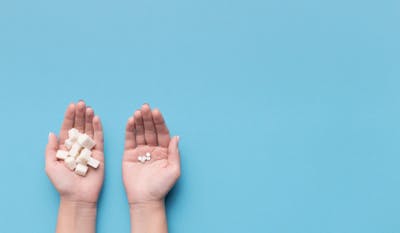
The nocebo effect happens when you experience a negative effect simply by believing that something negative would happen. For instance, if someone told you that a specific pill would give you the flu, and you experienced the flu even though it was just a sugar pill, then you experienced the nocebo effect.
One of our favorite stroke recovery tips here at Flint Rehab is to always keep an eye out for the nocebo effect. For instance, if a doctor told you that you’ll never be able to walk again, be mindful of that potential nocebo effect. Just because a doctor said your recovery will be limited doesn’t mean progress isn’t possible.
Many stroke survivor stories involve people pushing their limits and achieving milestones that were once considered impossible. If these survivors allowed the nocebo effect to stop them from pursuing recovery, they wouldn’t be where they are today.
To achieve your highest recovery, constantly remain curious about your potential.
14. Believe in a Full Recovery
There’s a famous saying that says, “Shoot for the moon. Even if you miss, you’ll land among the stars.” What if we turned that into a stroke recovery tip?
What would happen if you got curious about your potential to reach a full recovery? Hopefully it might motivate you to take action, which naturally leads to results. It might not lead to a full recovery for everyone, but it will get you much farther than believing otherwise.
15. Read Motivational Quotes
Motivational quotes are like mini life lessons boiled down into a sentence or two, making them powerful sources of motivation when we need it most. Whenever you’re feeling down, read some inspirational quotes for stroke survivors. You will never find a shortage of them on Pinterest.
16. Do What Elite Athletes Do: Visualize
Visualization is a powerful neuroscience technique that can help rewire your brain and improve performance. Michael Phelps, 18 time Olympic gold medalist, used visualization to prepare for his swim meets. You can apply the same technique to stroke recovery.
Researchers have already proved that it works. Visualization can help rewire the brain after stroke by triggering neuroplasticity the same way that physical practice does. While visualization cannot substitute physical therapy, combining the two can lead to better results.
17. Grow Your Brain with Meditation
Meditation is an underrated stroke recovery technique. It might seem too simple to make any real difference, but the science has proven otherwise!
Regular meditation has been shown to help grow your brain, regulate emotion, and reduce fatigue. All of these benefits are valuable for stroke survivors. If you need help getting started, try using the Calm app (one of our top recommended apps for stroke patients) as it contains guided meditations.
Stroke Recovery Tips on Happiness
In this final section, you’ll discover some stroke recovery tips that help enhance happiness. Hopefully, by improving your mindset, it can help motivate you to take more action and, as a result, encourage recovery.
18. Reverse Negativity
Our brain naturally has a negative bias where we remember negative events more vividly than positive events. Luckily gratitude can help counteract this mechanism. To cultivate an attitude of gratitude, spend some time every day – even if it’s just for 2 minutes – writing down things you’re grateful for in a journal. Once this habit is developed, it will train your brain to notice more and more things to be grateful for. This is an example of using neuroplasticity to boost your mindset.
19. Improve Your Posture to Boost Motivation

Do you struggle with getting motivated to do your rehab exercises at home? Well, this stroke recovery tip provides an unassuming way to get motivated: using your posture to influence your hormones.
Try this: Lift your arms up into a V (using one arm works just as well) and puff your chest up. How do you feel?
You probably feel more presence, confidence, and comfort in your body. At least, that’s what psychologist Amy Cuddy discovered during her research on body language.
She calls it “power posing” — which includes expanding your body to make yourself feel big. This practice helps boost testosterone (the dominance hormone) and reduces cortisol (the stress hormone). This winning combination makes us feel positive and powerful when we’re in that posture.
So, the next time you’re feeling unmotivated to do your stroke recovery exercises at home, strike a power pose and see if that helps.
20. Happy Gut, Happy Brain
Your gut health is closely tied to your brain health through the gut-brain axis. Many studies have linked an unhealthy microbiome (the ecosystem of 100 trillion little bacteria in your gut) with anxiety and depression. A great way to improve the health of your microbiome is to make sure you’re getting probiotics in your diet, which can be found in cultured foods like yogurt and kefir, or can be taken as a supplement after checking with your doctor.
21. Create and Enforce Boundaries

If you’re a caregiver, it’s important to respect the boundaries of your loved one and try not to do too much for them; otherwise, your loved one won’t have the experience necessary for recovery. Similarly, if you’re a survivor, it’s also important to protect your boundaries. If a caregiver is doing too much, kindly ask them to stop.
On the other hand, if you find yourself unable to get through your day without growing exhausted or frustrated, that could indicate that you need to ask for help. Try to have open, ongoing conversations with your caregivers and loved ones about how much you need help with and how much you want to do on your own.
22. Develop Your Self-Confidence
After a stroke, it’s understandable if your self-confidence is reduced. If this feeling lasts long-term, it could be a sign to turn inward and take some good psychological care of yourself.
It might be a good time to explore the world of psychotherapy so that you can talk to someone about your experiences. Surviving a stroke and enduring the life-changes that follow are no small feat. Having a therapist to express your frustrations to can be a great way to improve self-confidence and self-esteem.
If you’re more of a do-it-yourself type of person, try exploring stroke recovery books that address the emotional side of recovery, such as our book Healing and Happiness After Stroke.
23. Give Yourself Permission to Grieve
Everyone who goes through loss must deal with grief. And stroke recovery can involve different forms of loss for different people — such as loss of independence, loss of beloved hobbies, or even loss of identity.
It’s normal to go through the stages of grief if your life was significantly impacted by your stroke. The stages of grief include denial, bargaining, anger, depression, and acceptance — and it’s not linear. Sometimes people move between anger and depression many times before getting to acceptance.
But one thing is clear: the only way out is through. Instead of trying to avoid these emotions, it can be helpful to embrace them and give yourself permission to grieve.
24. Make Peace with Slow
We live in a society that idolizes busyness and productivity. As you can imagine, this can create distress when we can’t do things as fast as we once could.
However, overcoming the secondary effects of a stroke often means relearning how to do some things as if for the first time; such as walking, talking, or getting dressed. These daily tasks may take longer than they once did (and you may need a nap after doing them). Try your best to make peace with the slow pace of daily living.
Even though it can be frustrating some days, remember that doing activities on your own helps provide the stimulation and experience that your brain needs for neuroplasticity and healing.
25. Use Positive Psychology
You’re almost to the end, and hopefully you’re starting to see how happiness can help accelerate recovery from stroke.
A great place to continue learning about the emotional side of stroke recovery is our book called Healing & Happiness After Stroke. It will show you exactly how to boost self-esteem, happiness, and recovery by using positive psychology tactics. Check it out on Amazon.
We hope these stroke recovery tips help you find healing and motivation on the road to recovery.
Keep It Going: Download Our Stroke Recovery Ebook for Free
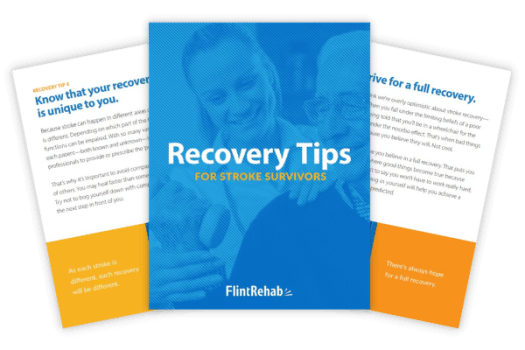
Get our free stroke recovery ebook by signing up below! It contains 15 tips every stroke survivor and caregiver must know. You’ll also receive our weekly Monday newsletter that contains 5 articles on stroke recovery. We will never sell your email address, and we never spam. That we promise.
Related:
Speed is key during stroke | The Star
Uncovering Stroke Myths - YouTube
Related posts:
Recognition and Management of Stroke
When A Stroke Strikes

Exercises for Stroke Patients
Attacking the brain
Stroke kills more women than men each year but there are preventive steps you can take to minimise your risks.
Second chance at life after stroke
A leading cause of disability and fatality
Core Exercises for Stroke Patients to Improve Balance and Walking (Gait)
Qigong, stroke Recovery, 回春医疗保健操, 康復的秘訣, 中醫復健法, 膀胱經, 排毒
Death by overwork
Better access for stroke patients, and Helping stroke survivors in a pandemic








